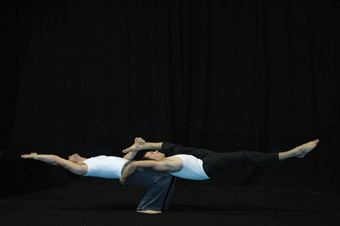 |
David Carberry, Darcy Grant, The Space Between photo John Donegan |
Acrobats who move like dancers are rare and beautiful, in part because most of us sitting in the audience know our bodies would crack if we tried to do this or that. Even more rare are the acrobat-dancers willing to use their unusual ability to create startling body shapes in support of moods and themes, not just for the sake of astonishment alone. David Carberry, Darcy Grant and Chelsea McGuffin, three members of the Brisbane-based physical theatre group Circa, have profound physical vocabularies. Each can move from stillness to a rapid flip with apparent effortlessness; each can hang from one arm, one foot or another’s neck, if the choreography calls for it.
These performers are amazing, I can’t avoid that word. Look at him fall backwards with a rigid body and arms. How does he flip backwards at the last minute to trace a full circle with his legs and not hit the floor? Both men repeat this phrase several times, which lets the audience figure out the mechanics, but it remains surprising. In other words, it’s not that the audience isn’t drawn in by the power of the performers’ extreme actions, but Circa uses their physical vocabularly to push and pull each other, and us, through different moods, questioning whether or how people desire closeness. It starts abstractly, then reveals a storyline where the woman is choosing between the two men.
Intimacy and distance can be equally painful. When the rejected man dances alone, he’s a contortionist, bending his legs over and around his neck, pulling a shoulder out of joint, then dancing serenely through a smooth phrase or two. When the woman dances with him, she punishes his limbs. She stands on his shoulders, steps down to his thighs, forces him to turn over onto his knees and remains standing on his flesh, not the floor, by walking on his calves. She repeats this coiling ruthlessness and he takes it. Distance, rejection, hurts.
Intimacy isn’t necessarily more cosy in this piece. Intensely close bodies scratch, pull and rub against each other. On the trapeze, the woman and the taller man climb up and down each other. She stands on the wooden bar, he wraps his legs around her ankles and lets his weight fall. Or he hangs upside down and she slips deliberately down his body, hand-grip by hand-grip, until she’s suspended only by her mouth, his hand holding her weight by her skull. (I think everyone in the theatre twitched here.) Almost instantly, she climbs smoothly back up his arms.
This harsh moment resonates exactly because she moves on. Similarly, the rejected man shifted quickly into and out of extreme positions such as using his apparently dislocated (presumably double-jointed) shoulder to balance between one contortion and the next. If either had hung in place longer, it would have become a trick, a “look what I can do.” The timing throughout the performance is consistently flawless in this way.
Pace is also affected when tumbling animations, always in black and white, project onto the floor. For those moments, the dancers commit to moving only in that light. The most effective of these is a vibrating grid pattern that appears several times to frame the two men dancing together, initially as supple equals, later as rivals who think one must dominate the other.
Playful, smart musical choices support the emotional arc of the performance by emphasizing mood shifts (Bach transitions to rock) or by adding lyrics. There are things a body simply can’t describe, like “there’s a piece that was torn from the morning, and it hangs in the gallery of frost” (Leonard Cohen, “Take This Waltz”). And the body, or at least these three remarkable bodies, gets to play with saying the things it says best: muscular phrases about passion, jealousy, tension, lightness, the mysterious hollow of the mouth, and the even more mysterious and wildly elastic spaces that resonate between people.
Circa, The Space Between, created by Yaron Lifschitz and the Cira Ensemble, performed by David Carberry, Darcy Grant, Chelsea McGuffin, concept, direction, lights, sound design, multimedia and operation Yaron Lifschitz; Performance Works, Granville Island, Jan 22-26; PuSh International Festival of Performing Arts, Jan 16-Feb 3
Meg Walker is a nomadic fiction and non-fiction writer currently based in Vancouver, where she also spends plenty of time making visual art.
© Meg Walker; for permission to reproduce apply to [email protected]








 back
back